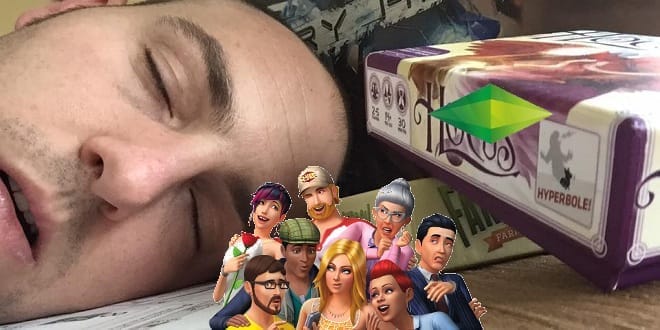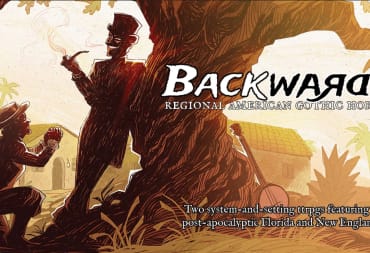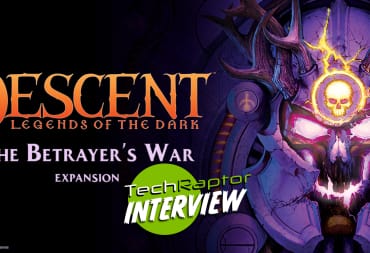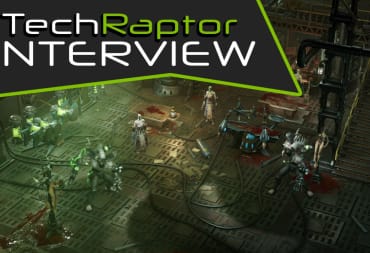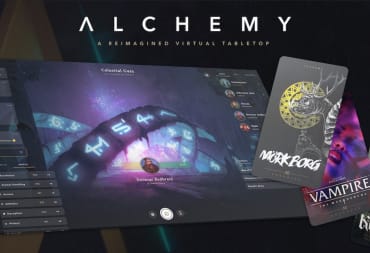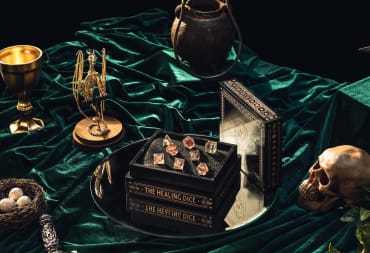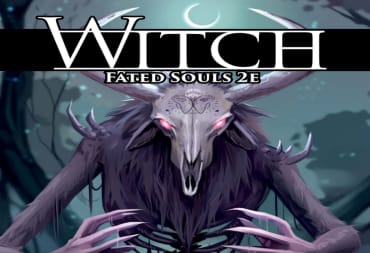At Gen Con 2016 we met Grant Rodiek, who was at the show with Portal Games showing off his hotly anticipated game Cry Havoc. While Grant designs board games, he also self-publishes them, as well as holding a day job working on the massively popular The Sims franchise for Maxis. He recently let us pick his brain about the work that he does in both the tabletop and video game worlds, his favorite cocktail and desert choices, and his thoughts on the relevance of scored reviews in both worlds.
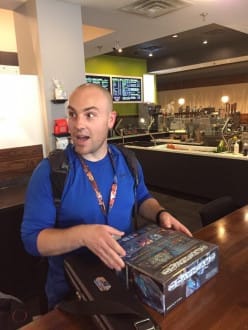
TechRaptor: Please tell us about yourself.
Grant: I'm a 33 year old resident of San Francisco where I live with my wife and dog. Professionally, I'm an 11 year veteran of the video game industry, primarily working on The Sims with Maxis, and a 6 year veteran of board game design and now, publishing. I'm a big history nerd, I love the SF restaurant scene, and my favorite cocktail is the Negroni.
TechRaptor: What is your favorite flavor of pie?
Grant: I had a slice of pie in St Louis called Sugarfire from the restaurant of the same name. It was basically a pecan pie, minus the pecans, and it was delightful.
TechRaptor: Being a developer in both the video gaming and tabletop gaming worlds, what are the similarities that you see in your day-to-day development processes?
Grant: I try to bring a sense of process and organization to my board game projects. Video games are so expensive and have firm deadlines, most often. While that isn't the case with board games, I like to set deadlines and work in a focused manner. For example, I write my rules document before I ever test once. This shakes out a lot of bad ideas and exposes situations I hadn't initially considered. I've started noting every play and then cataloging what happened in the test, what changed, and I can use this to evaluate the history of the game, or bring ideas back. I also have a lot of experience taking in feedback, which helps. Finally, I try to use my gut sense of "is this good enough?" that I've used and seen at work to make changes, even dramatic ones. My video game training helps a great deal.
TechRaptor: Are there any aspects of the video game industry you wish could be applied to tabletop, and vice versa?
Grant: I think you're starting to see this now. Fantasy Flight implemented an app to control the bad guys in Decent, and I believe they said sales increased significantly. You're seeing them make Mansions of Madness 2nd Edition, which uses an app. One Night Ultimate Aliens uses an app, and First Martians will use an app.
Video games allow board games to have status effects (i.e. lose one health every turn) or present a wide variety of outcomes simply. In many ways, the XCOM board game app is effectively a ton of cards being drawn off a deck in real time. However, I worry adding digital elements will convince designers they can be more complicated. We do this all the time in video games. A general rule of thumb is that if the player doesn't know why a thing happened, it might as well be random. Just because you can now have a 50 stats for an article of armor doesn't mean you should.
I think video games could benefit from the tangible, tactile nature of board games. Skylanders sort of did this. I think board games could benefit from broader narrative options and better status tracking from video games.
TechRaptor: Do you notice any major differences in the customer response to digital versus physical products?
Grant: Consumers have been trained differently in both ecosystems. I think tabletop customers are far more price sensitive than video gamers. Asmodee is changing how they work with online retailers and this has caused a bit of a furor with more folks than I would expect.
Video gamers were basically told Consoles cost X and games cost $60, and that's just that. But, folks gets incredibly angry still when it comes to DLC. Board gamers generally are okay with more content. Magic is the bread and butter of many game stores and Fantasy Flight is doing incredibly well with several LCG titles, as well as miniatures games like Armada and X-Wing that have a steady drip of new content.
I think the indie scene is stronger in video games, in that the term "indie" holds more weight. But, this is mostly because almost everyone in tabletop IS indie. Most companies are 1-2 folks making things, contracting for art and manufacturing. It's just much more a garage style industry than video games.
TechRaptor: How similar, or different, are the creative processes between video games and tabletop games?
Grant: It really depends on your deadlines. In video games, the teams and budgets are enormous, which means you need to be cautious. You don't want to send 25 people in a direction you haven't really considered thoroughly. A scant few teams in the industry are fully divorced from deadlines, but it's generally not the case for most of us. We do a lot of iteration and experimenting, but we have to be far more disciplined and regimented with how we execute against it.
Board games on the other hand allow for constant experimentation. I can very easily rip out a card, tweak its effect, change the hit probability, all of that in seconds. A feature in a video game might take 3 weeks to see the bare bones version, whereas I can play a full version of a board game on my 2nd or 3rd test. It won't be good, but it'll be there.
Basically, in video games we have to do a lot more up front thinking, leaning on our experiences, our budget limitations, marketing input, and gut instincts. In board games, I can meander through the woods until I find something cool.
TechRaptor: Do you feel more pressure being part of a huge team that creates a video game, or being part of a small team that creates a tabletop game?
Grant: I feel quite a bit of pressure on both! I'm a lead producer working on a lot of different titles with a lot of direct reports in video games. I'm constantly trying to figure out how to be a better mentor, be decisive without being a jerk, figuring out the times to fight hard or let it go, all of that. But, as a tabletop publisher, I've basically been losing money for two years. I'm in the early larval stage where my print runs aren't really big enough to generate great profits due to margins, and if a game is bad, it's literally 100% my fault. I pace about a lot.
TechRaptor: You currently have two tabletop titles that you are self-publishing, Hocus and Farmageddon, and one, Cry Havoc that is being published by Portal Games. How do the experiences of working with a publisher differ from self-publishing, and why did you decide to team up with Portal Games for Cry Havoc?
Grant: Most simply, I couldn't have finished Cry Havoc on my own. I wanted to work with Portal due to their style of games and knowledge on making asymmetric games. I wanted to learn from them and I wanted Cry Havoc to be great. I started my own publishing company because I wanted to be an entrepreneur and I wanted to control the process from start to finish. I honestly love hiring artists, working with manufacturers, and packaging games in my garage. But, I've also chosen games that are smaller and more contained. I know that Hocus is the best it can be. Farmageddon is the best it can be. Cry Havoc wouldn't have been that with just me, so I sought to work with someone who could do that, and that was Portal.
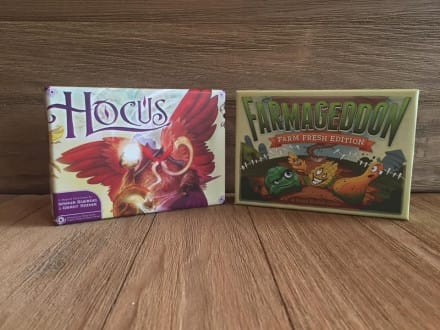
TechRaptor: You are very directly involved with the community around your tabletop games. Is that level of involvement even possible with a franchise as large as The Sims?
Grant: Yes, actually, it is. We have a program called SimGuru where several producers, designers, engineers, and others have Twitter accounts where they talk directly to the fans. 10 years ago this wouldn't have been allowed. Our community relations were far more strictly controlled. But, folks know the guidelines of what they can and cannot talk about and we try to be hands on with the community.
As with all things, it's a matter of scale. There are millions of Sims fans and customers, versus (right now) hundreds of Cry Havoc fans (as the game isn't properly released yet). Just like the Sims, it's possible to answer a question wrong, or goof in some other way. It just a matter of going "Whoops, I did that wrong" and trying to be responsive and transparent.
TechRaptor: How do you feel about digital adaptations of tabletop games?
Grant: For me it's mostly a shrug. I've played just shy of 2000 games of Star Realms and Ascension each, and hundreds of games of Carcassonne on my phone. But, I play tabletop games largely as a social event and I want to sit with my friends, have a beer, and shuffle the cards. Often times the digital version just doesn't compare, so I've largely skipped the whole browser based board game scene.
TechRaptor: More and more new tabletop games are using app integration as core aspects of the game. How do you feel about these games that straddle the line between tabletop and digital product?
Grant: I think it's smart, and I think it's a proven "good idea" by the market. I think folks need to not lose site of tabletop games being tangible and about social interaction with people at the table. Folks cannot be drawn so into the app they forget they're playing with friends in front of them.
I personally haven't loved many of the app games yet, but they were totally fine and I'm glad others do.
TechRaptor: Board games have seen an enormous surge in popularity recently. Do you have any thoughts or insight as to what might be the cause?
Grant: Generally speaking, I think publishers and designers have greatly improved the level of complexity in the games. If you look at Rosewater's efforts in Magic with "New World Order" and Fantasy Flight's complete 180, you'll see roughly what I'm talking about. Roughly when I started playing board games seriously about 6+ years ago, I was terrified of Fantasy Flight Games. They were always just so complex. Now, they're trying to be innovative in how they write their rules, and their games are just more focused, clean, and easy to learn. I'm a huge fan of them, and years ago I was not at all.
There are other things helping. Video rules explanations go a long way. Rules are the number one hindrance for board games, which is why reducing complexity and rules videos are so important.
I think some studios are doing wonderful things with popular brands, which always helps. You can buy great Star Wars games, for example. Great Game of Thrones games.
Finally, video games have become somewhat stagnant. Because they are so risky and so expensive, you're seeing more and more companies focus on somewhat mindless time waster mobile apps, which is fine, or a sequel to a game you've already played a dozen times. Nerds want to play games, and they are beginning to find out there is this huge library of board games. Most board games require multiple people to play, so the hobby literally creatures word of mouth just by existing in the first place. It's a compelling space and I think people want to be a part of it.
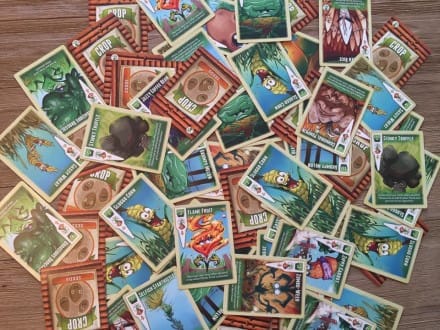
TechRaptor: When creating a tabletop game, do you usually come up with the theme or the mechanics first?
Grant: I think of an experience I want to convey, then find the right thematic and mechanical tools to support it. For one of my prototypes, Solstice, I wanted to make a game that felt like Dune (the book), and I knew I wanted to make a game with drafting. With Farmageddon, I wanted a silly game built around farming, so I thought about the rough experience of farming in a nut shell and abstracted it to a more Looney Tunes style feeling. Hocus has almost no theme, and is built around the idea of "poker plus spells."
I'm probably not the most thematic designer, though to get nitpicky, I think most people completely miss theme. Theme is not pretty art and custom meeples. Theme is when the actions you take represent the thing you're doing within the world. Theme helps present a narrative arc. Lately, I've been making short, 30 minute strategy games, and there just isn't much space in 30 minutes to create a player driven narrative arc!
Basically, I try to think about what would be a cool thing to do, and then figure out the best ways to execute that.
TechRaptor: Speaking of theme and mechanics, which do you feel is more important in a tabletop game?
Grant: The game should be fun. That's a construct of nice mechanisms, a theme that helps set the stage of folks, compelling and tactile components that are a delight to hold, and interesting ways to interact with and best your opponents. I think some truly terrible designs have come about because somebody kept saying "Oh and it would be sweet if..." built around a pirate ship or zombie theme. I also think there are far too many games that just do set collection just because, without doing something special, or different, or exciting with the mechanism.
I think designers should be flexible and not too attached to their theme or the mechanism. More than anything, the overall product, the fun, and the experience it provides.
TechRaptor: Is it easier for you to be creative in video games where things are set, such as the engine, the theme, the genre etc. or in the tabletop space, where you can try to abstract just about any idea?
Grant: I think constraints are fantastic for creativity, and I try to leverage them in both spaces. At Maxis, some of our best ideas have come from figuring out how to execute a weird, real life experience using a short deadline, or an engine restriction, viewed through the lens of what our community loves. Having a passionate, vocal community really helps us.
In board games, I always try to define my boundaries within my goals. Cry Havoc, for example, started with 2-4 players, no dice, and 1-2 hour play time. Hocus was poker plus spells, which seems broad, but it really isn't. Solstice is drafting and deception.
If you know what you want from a game, you'll find that the possibility space is pretty constrained, in a good way. It's when you don't know what you want that you wonder forever.
TechRaptor: Do you feel that the importance placed on review scores (even being tied to some developer's bonuses in some cases), especially the aggregate on Metacritic, is warranted?
Grant: It's complicated! I've worked in an Electronic Arts studio my entire career, never as a studio being published by a company, so I don't have any experience with my bonus being tied to Metacritic. Tying the bonus exclusively to sales can be unfair to the developer if the publisher fails to market it well, or something unexpected or out of anyone's control affects sales. Metacritic can be unfair because frankly it's a wanton and ridiculous gauge of a game's quality. At the end of the day, I think most people are trying to find a way to fairly assess a game beyond a single executive's whims, but it's tough. I'm glad I don't have to deal with that.
TechRaptor: Are review scores as important in the boardgame world? Should they be?
Grant: They can be. Tom Vasel enthusiastically praising Cry Havoc has altered the course of the game's success. Shut Up and Sit Down can breath new life into a game. A few times now they've gushed about a game like Sherlock Holmes Consulting Detective (which is fabulous), which pushed it to be sold out, get a reprint, and now, see new expansions and content come out.
For Hyperbole right now, we probably aren't going to get a big, "oh my god!" review from one of the big big reviewers. But, Zee Garcia and Joel Eddy both recommended Hocus. Our user ratings are at 7.01 on BGG, which is quite good for a card game. I consistently see it praised and spoken of well from Twitter users, BGG threads, and more. We rely more on word of mouth right now until the brand is established.
So, I think review scores are really important, but I think it really depends on who they come from, when. I think the value of reviews naturally decreases as more people engage in game discussion on social media and that word of mouth volume increases. I think it decreases as sites like BGG become more accessible to bring in new people and new voices. I think people like Watch it Played to a great service by simply showing how great games are played and enjoyed. I think Shut Up and Sit Down's focus on "hey here's a game you will love we promise" is a strong one for the hobby.
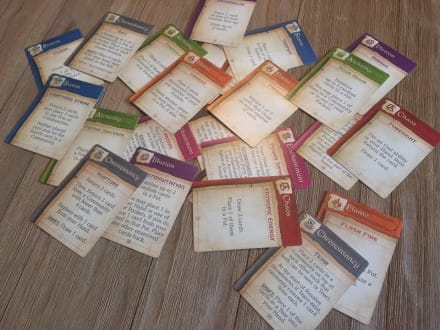
TechRaptor: What are your favorite games (feel free to list both digital and tabletop)?
Grant: Currently, my favorite tabletop games are Netrunner, Star Wars Armada, Merchants and Marauders, and Rex. Oh, and Combat Commander: Europe and Carcassonne.
I really don't play many video games these days, but my recent favorites include TitanFall (I'm very excited for the sequel) and XCom (need a new computer to play the sequel). I think both of those games are perfect.
TechRaptor: For the innumerable fans of The Sims out there, is there anything you can tell us about what's coming in the future for the franchise?
Grant: Ha, nice try! No, I cannot tell you anything, not if I want to keep my job. I will say a lot of us come to work every day and work very hard on making The Sims a great game. Many of us have been at it a very long time and the game is near and dear to our hearts.
TechRaptor: Cry Havoc will be hitting game store shelves in the near future, but where can people find copies of Farmageddon and Hocus?
Grant: Both are available right now through our web store. Direct sales are very helpful for staying in business, and we always send promos.
Hocus is also in fine hobby game stores now, and Farmageddon will be very soon. I'm working on shipping copies to my distributor right now. My hope is by October at the latest! Regardless of how you obtain our games, always feel free to contact me (on our site) to get the promos. Always free to any customer.
TechRaptor: You mentioned Solstice a few times. What else can you tell us about the game? Is that what's next from Hyperbole games?
Grant: Solstice has been in the works for almost a year now and is almost finished. At least, the core is finished. I recently introduced a new advanced mode with new asymmetric cards that will take some time to balance. Solstice is my intended new release for Hyperbole Games in 2017.
Solstice is a 2-4 player game that takes about 30 minutes to play. It is a game in which you draft cards, yours or opponents, then you play them face down to various regions. When you do this, you disclose a little piece of information. So, based on the draft, and the clues, you slowly build a picture of what's in play, where. Then, the cards are revealed and resolved. I think it's a fresh drafting game, and though the individual pieces are simple, the strategy is deep. I'm pleased with it and think people who give it a few plays to learn it will find they have a game they can play over and over again. I recently had one tester play it a dozen times in just a few days!
I also have a secret project that folks will be finding out more in, oh, October, but for now, I can't say too much.
TechRaptor: Do you have any parting words you'd like to share with our readers?
Grant: Thanks for taking the time to hear me blather on about games. Thanks for supporting me. I love games -- they are truly my 24/7 obsession. Folks who give me a chance by buying one of my titles have no idea how much it means to me and how much it helps keep me sane by being able to continue making games. So, thank you!
TechRaptor: Thank you so much for your time!
Have a tip, or want to point out something we missed? Leave a Comment or e-mail us at tips@techraptor.net
